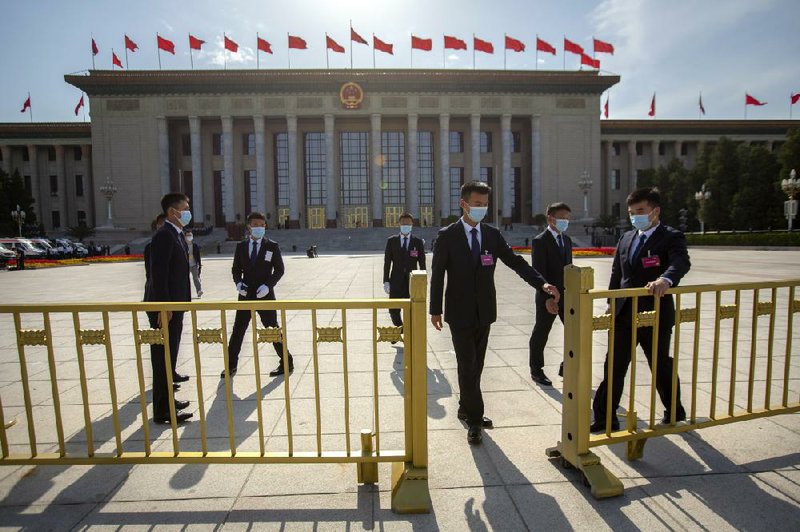BEIJING -- China's legislature endorsed a national-security law for Hong Kong on Thursday that has strained relations with the United States and Britain and prompted new protests in the territory.
The National People's Congress approved the bill as it wrapped up an annual session that was held under intensive anti-coronavirus controls. The vote was 2,878-1 with six abstentions, in line with the high-profile but largely ceremonial body's custom of near-unanimous support for all legal changes decided by the ruling Communist Party.
The law will alter Hong Kong's mini-constitution, or Basic Law, to require the territory to enforce measures to be decided by the National People's Congress' standing committee, a small body controlled by the ruling party that handles most lawmaking work.
The law reflects the determination of President Xi Jinping's government to tighten control over Hong Kong after 11 months of anti-government protests. Activists in Hong Kong say the law will undermine the "high degree of autonomy" promised to the former British colony when it was handed back to China in 1997 under a "one country, two systems" framework and might be used to suppress political activity.
[Video not showing up above? Click here to watch » https://www.youtube.com/watch?v=p-gFyoBTe2w]
For its part, the British government said Thursday that it will grant hundreds of thousands of Hong Kong residents greater visa rights if China doesn't scrap the new law.
U.K. Foreign Secretary Dominic Raab said about 300,000 people in Hong Kong who hold British national [overseas] passports would be able to stay in Britain for 12 months instead of the current six if China does not rethink its plan. Raab said the length of stay also would be extendable and provide "a pathway" to U.K. citizenship.
Premier Li Keqiang, the country's No. 2 leader, defended the national-security law as consistent with Beijing's promises.
"The decision adopted by the [National People's Congress] session is designed for steady implementation of 'one country, two systems' and Hong Kong's long-term prosperity and stability," Li said at a news conference.
[Gallery not loading above? Click here for more photos » arkansasonline.com/529hongkong/]
The law and the way it is being enacted prompted Secretary of State Mike Pompeo on Wednesday to announce that Washington will no longer treat Hong Kong as autonomous from Beijing. That could hurt the territory's attractiveness as a business center.
Many analysts now expect the Trump administration to strip Hong Kong of its special status, a move that would essentially mean that the United States would treat Hong Kong residents and companies in the same way it treats Chinese ones.
"This is not something that we should resort to immediately," said Bonnie Glaser, director of the China Power Project at the Center for Strategic and International Studies, describing the move as "the nuclear option."
"This will have all sorts of negative impacts on Hong Kong and would harm many Hong Kongers in many ways," she said.
Li called for mutual respect and Sino-U.S. cooperation to promote "extensive common interests" in resolving global problems and promoting trade, science and other fields.
"Both countries stand to gain from cooperation and lose from confrontation," Li said.
Hong Kongers have faced down riot police to protest the plan this week. Hundreds of them, including schoolchildren in uniform and others who were simply shouting slogans, were apprehended.
On Thursday, three pro-democracy lawmakers were ejected from Hong Kong's legislative chamber during a debate over a bill that would criminalize insulting or abusing the Chinese national anthem.
Also Thursday, the National People's Congress approved a government budget that will increase spending to generate jobs to try to reverse an economic slump after Chinese industries were shut down to fight the coronavirus pandemic.
The standing committee will draft the full text of the law, which should be passed by August, but the outlines of it have already been well telegraphed -- the law will criminalize "foreign interference," terrorism, secessionist activities and subversion of state power.
Hong Kong's Beijing-backed chief executive and a delegate to the lawmaking body, Carrie Lam, welcomed the move Thursday and pledged to "enhance enforcement and public education" to help safeguard national security.
Bar associations from Hong Kong to New York have expressed grave concerns about the new law, and legal experts say the legislation seems specifically designed to stop the kinds of protests against China that broke out in Hong Kong last year.
"Beijing's official explanation gave me the feeling that the legislation will aim to prohibit those activities and conduct," said Eric TM Cheung, a law professor at the University of Hong Kong.
"It's quite alarming. This means that advocating for self-determination or independence or anti-government protests could all be branded as seriously endangering national security," Cheung said.
Information for this article was contributed by Joe McDonald of The Associated Press and by Anna Fifield of The Washington Post.
A Section on 05/29/2020
